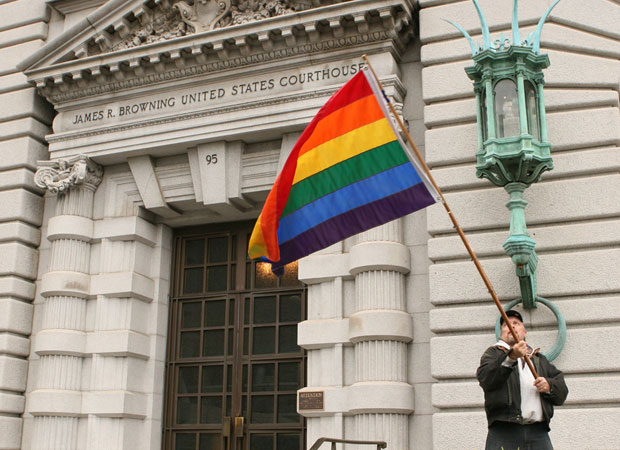 The Supreme Court is expected to rule on Proposition 8 next week. There are a number of possible outcomes.
The Supreme Court is expected to rule on Proposition 8 next week. There are a number of possible outcomes.
(If you're confused about any of this, start by reading the summary of what you need to know about Prop. 8 at the Supreme Court.)
- The U.S. Supreme Court could affirm the 9th Circuit decision that invalidated Prop. 8's constitutionality. Such a ruling would legalize same-sex marriage in California. It could potentially go beyond California and legalize same-sex marriage nationwide.
- The court could dismiss the case, by ruling that the petition for review should never have been granted. This would leave the 9th Circuit Court's decision that Prop. 8 is unconstitutional as the final binding decision. This ruling, however, was narrowly defined and would likely pertain solely to California.
- The court could hold that the Prop. 8 backers lack standing under the federal law to appeal. This would vacate the 9th Circuit's decision, leaving U.S. District Court Judge Vaughn Walker's ruling that Prop. 8 is unconstitutional as final, making same-sex marriage legal in California. However, this would leave open the possibility that Prop. 8 supporters could challenge whether that ruling applies statewide.
- The court could reverse the 9th Circuit, upholding Prop. 8 as valid. This would mean that same-sex marriage would continue to be illegal in California. However, with public opinion on same-sex marriage shifting, according to Pew, it is likely that supporters of the issue would put a counteracting proposition on the ballot in the future.
The third of the four scenarios, in which the court rules that the proponents lacked legal standing to challenge Walker's decision, is believed to be the most likely. UC Davis law professor Vikram Amar told KQED's Scott Shafer last week that a broad decision declaring a fundamental, nationwide right to same-sex marriage is highly unlikely.
“It's very rare for the court to invalidate the laws of two-thirds or three-quarters of the states,” Amar said. He noted that when bans on interracial marriage were struck down in 1967, only 16 states had such laws -- compared with the 35 that now ban gay marriage.